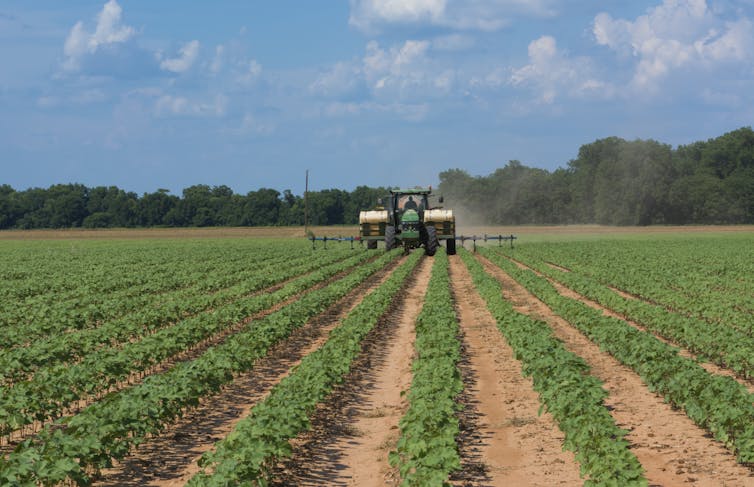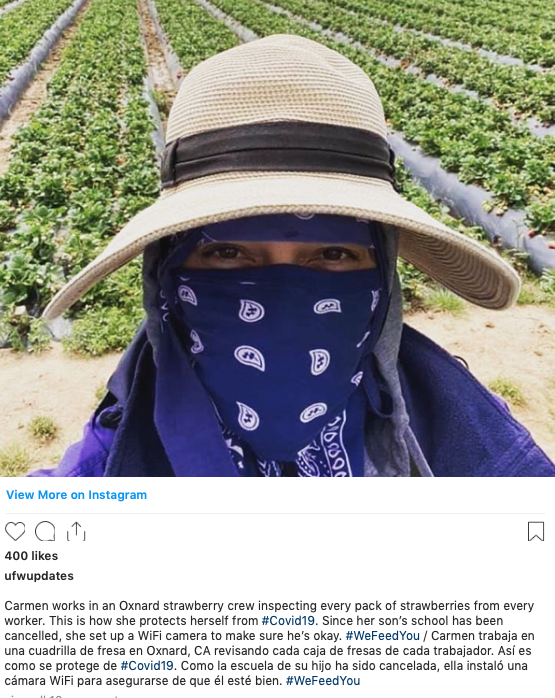Melanie Bateman says the crisis presents an opportunity for farmers to adjust their pest management practices.

By Melanie Bateman
University of Neuchâtel
 As the COVID-19 pandemic spreads around the world, vital N95 masks and other personal protective equipment have been hard to come by, even for those who need them most.
As the COVID-19 pandemic spreads around the world, vital N95 masks and other personal protective equipment have been hard to come by, even for those who need them most.
The World Health Organization estimates that the crisis has driven demand for this equipment, known as PPE, 100 times higher than normal. Even with dramatic increases in production, manufacturers have said they’ll likely be unable to meet demand for the foreseeable future.
And the WHO has warned that the severe shortage is putting the lives of health care workers at risk.
But it’s not just health care workers and other care providers who need PPE – especially those N95 masks, technically known as respirators. These devices are also vital to the safety of workers in a host of other industries, from building trades to agriculture.
As an entomologist who studies and teaches about pesticide risk reduction, I am particularly concerned about what the shortage may mean for farmworkers, whom the Department of Homeland Security classifies as essential workers – people who remain on the job even where others have been told to stay home.
U.S. Pesticides & Respiratory Health
Hundreds of thousands of farmworkers in the United States routinely encounter pesticides on the job And some of the most widely used pesticides in the U.S. pose serious health risks, ranging from causing occupational asthma and respiratory irritation to death.
Epidemiological studies, including a long-term study of over 80,000 licensed pesticides applicators conducted by the National Institutes of Health, have found links between pesticides and respiratory problems, ranging from acute symptoms such as dry throat, difficulty breathing, chest pain, coughing and wheezing to chronic conditions like decreased lung function, occupational asthma, chronic obstructive pulmonary disease and lung cancer.
Another study by the National Institute for Occupational Safety and Health found that farmworkers had significantly elevated mortality for a number of respiratory conditions, including hypersensitivity pneumonitis (also known as “farmer’s lung”), asthma, bronchitis and pneumonia.
Masks can be vital to minimizing the risk. The current shortage of masks comes on top of other risks related to the current health emergency. For example, farm workers often have preexisting conditions, such as those affecting respiratory health, that are risk factors for coronavirus. Many live and work in crowded conditions, and have difficulty accessing medical care.
 Farm Workers
Farm Workers
Many farmers and farm workers, especially those who work with pesticides, carry N95 masks. These devices are made of non-woven polypropylene fiber and meet strict government standards for filtering out particles and droplets as small as 0.3 microns, or three one-thousandths of a millimeter. These are often part of a broader PPE kit that can include respiratory protection, gloves, headgear and body, foot and eye protection.
Under U.S. law, employers must provide appropriate PPE to workers who handle pesticides. The kind of protective equipment needed is determined by a pesticide product’s level of toxicity for five types of acute exposure – oral, dermal, inhalation, eye irritation and skin irritation – as well as whether it is a gas, solid or liquid, and whether the work is being done outdoors or in an enclosed space.
Anyone who handles or assists with the application of pesticides is required to use filtering masks as good as N95s or better when they work with products which are lethal or toxic if inhaled, or if risk assessments identify other issues that need to be addressed.
Managing Pests Differently
As the U.S. growing season gets underway, early reports indicate that most farmers have the PPE they need for now. But each N95 mask should only be used for eight hours before being discarded, so with a shortage of masks that is unlikely to abate soon, farmworkers are likely to be caught short. So far, local agricultural agencies have only provided limited guidance on how to address the shortage.
So what should farmers and farm workers do? Specific actions will depend on the crop and the pesticide product, but here are some general recommendations.
First, when labels require the use of masks, farmers and farm workers should not work without them. This is unsafe and often illegal. Some hazardous pesticides are only allowed in the market because it is assumed that the use of PPE will considerably limit exposure.
Nor should pesticide handlers use improvised masks. Bandannas and other kinds of ordinary cloth worn over the nose and mouth do not filter out harmful pesticide particles and droplets, and can even act as reservoirs for pesticide residues.
Instead, I believe farmers should consider reducing risks through adjusting their pest management practices. This is already a recommended best practice: The International Labour Organization’s Code of Practice on Safety and Health in Agriculture states that the first line of defense against health effects caused by pesticides should be eliminating or reducing exposure to the hazard, and that PPE should only be used as a last resort.
The U.S. Occupational Safety and Health Administration also advises that respiratory hazards should be addressed through a “hierarchy of controls.”
These reductions can be achieved in a number of ways. They include integrated pest management, an approach that finely tunes pesticide application and emphasizes least-risk options; engineering controls that limit contact with pesticides; and replacing highly hazardous pesticides with less hazardous control measures.
Potential substitutes that are generally considered to be lower-risk pest management options include microbials (pesticides with a microorganism as the active ingredient), pheromones and beneficial insects. Used together with good crop management, these products can help keep pest levels under control and reduce the need for other pesticides.
But even some of these options pose risks that require use of masks. For instance, repeated exposure to the proteins in some popular microbials can cause allergic sensitization and even lung inflammation.
An Opportunity
Millions of workers in many fields depend on N95 masks and other PPE for safety and health, including farmers and farm workers who have the vital role of feeding the world. Ramping up PPE production may help alleviate the current shortage, but I believe researchers and governments should also try to identify and promote suitable alternatives to pesticides that require such PPE in the first place.
Melanie Bateman is a lecturer in integrated crop management at the University of Neuchâtel.
This article is republished from The Conversation under a Creative Commons license. Read the original article.
The views expressed are solely those of the author and may or may not reflect those of Consortium News.
Please Donate to Consortium News

The article’s strategy of reducing toxicity is sensible; references on feasibility and economic viability would be helpful.
The issue of mask supply appears to be complex, but clearly shows how a government of businessmen fails the people:
1. Makers of emergency products can stock essential molds and components to supply ten times the rate, with the considerable overhead required and paid by government, avoiding redundant emergency designs by new companies,
2. In emergency, government should mobilize to rapidly expand facilities, use generic machinery to augment those stockpiled essentials, and employ three shifts, permitting many times the ordinary supply;
3. By prioritizing test and approval grades and assigning the best where essential, a factor of 100 should be feasible.
The problem is convincing planners to invest where the risk is least certain, unlike hurricanes or earthquakes.
Our government should have planned, and should now plan to require and support realistic operations.
Approval of critical products should be conditional to readiness for rapid production expansion in foreseeable disasters.
Otherwise makers plan only for ordinary markets, shrug off big problems, and keep plodding during emergencies.
I ordered two masks over a month ago and still haven’t received them. When I followed up with the vendor I received a reply that is, in a word, breathtaking, because their masks are made in China. Their response follows:
Dear customer,
Thank you for shopping. We are aware that you urgently need this order.
Please note that these pandemic prevention products are in short supply worldwide. We make every
effort to find qualified products on the market and will ship them in the order of the payment day. We thank you for your understanding and your patience.
For other categories, it is noted that the epidemic in China has been well controlled and suppliers
have resumed work. We will send your order as soon as possible.
Our hearts are with those affected by the corona virus as we see the world around us change
dramatically. I hope you and your family are all healthy and safe.
If you have any special requests, please answer us and we will be happy to help you.
Sincerely yours,
Customer service
Ban the poisons.
Absolutely, Bardamu. These toxins – pesti-, herbi-, fungicides – should not be used at all, anywhere, under any circumstances. They are toxic to all life, human and other species (all species are essential to the well functioning of the earth and its soils – well, all species, but the humanimal one: that the planet needs not at all).
But hey – gotta let Monsanto-Bayer make unbelievable profits, raping the earth, killing it and its inhabitants. (It would seem that the upper echelons of Monsanto-Bayer don’t have children or grandchildren, only offshore, tax haven stashes; or perhaps they believe that *they* – being, of course, superior because undoubtedly in the top 1% or nearby – will survive their [hardly alone among their group] avaricious raping and plundering of this planet while the rest of us, including the none humanimals, can just die off. But who then will do their laundry? Clean their habitations? Cook their meals? Nanny their offspring?)